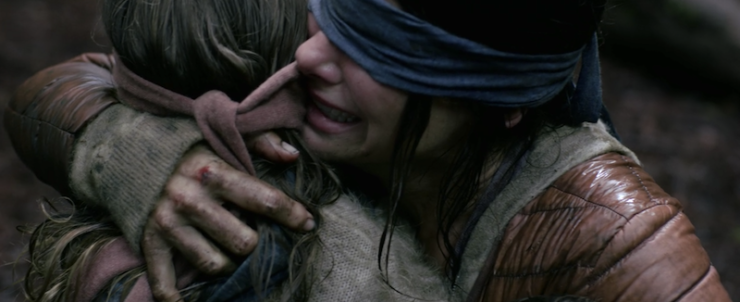Hollywood seems to have a thing for struggling fathers, running the gamut from hapless or distant to downright sinister. The trope is so common that it permeates every genre of fiction regardless of tone—even family-friendly fare like Mary Poppins Returns centers on a father’s inability to keep his family above water following the death of his wife.
I don’t think these stories are bad by virtue of their very existence—for some, they may even offer some much-needed catharsis—but their ubiquity is a bit troubling, especially when compared to how stories about women who struggle with parenting are often framed.
The number of “bad dads” in fiction really adds up when you attempt a count—even just sticking to science fiction and fantasy. Nearly every Avenger has a horrible dad or father-figure. Lucius Malfoy does a complete number on his son Draco in his quest to become a key member of Voldemort’s genocidal wizard gang. As an adult, Draco also struggles to be a good parent following the death of his wife. (And Snape’s dad is awful, and Dumbledore is a terrible surrogate parent, and James Potter’s legacy hangs over Harry for the entire series, and Harry has a hard time with his own son Albus…) All dads in Steven Spielberg movies are the worst, from Henry Jones, Sr to Roy Neary, calling back to the director’s own trauma at the divorce of his parents. Anakin Skywalker would probably win some kind of award for “Most Times Enacting Bodily Harm or Threatening Death to Offspring.” Supernatural’s Dean and Sam would never have become hunters if their militant, vengeance-driven father had actually given them a childhood. The dad from Jumanji is so uptight, his kid ends up running away from home and then getting stuck in a boardgame for over two decades. Point is, fatherhood is rough and having a dad is equally rough.
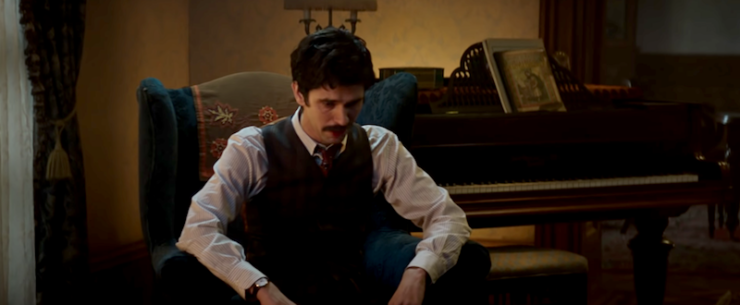
It’s not just that dads have trouble dad-ing that makes this trope awkward, though. It’s that having a difficult relationship with your father—or having a hard time being a father—is a plot device so common that we take it for granted. Bad dads aren’t surprising, or even upsetting. Men struggling with parenthood is something to sympathize with, or to worry about, like the journey of Michael Banks and his father before him in both Poppins films. It’s okay to struggle with fatherhood because it’s normal, according to a sizable chunk of the stories we read and watch.
But what about mothers?
In all-ages stories, moms tend to be one of two things; largely kind but relegated to the background, or dead. There are a few outliers in that category, but that’s still the modus operandi that we function beneath in a huge portion of genre fiction. Batman’s mother is dead; Joyce Byers of Stranger Things is a good mom who occasionally comes to the foreground in a story about her son and his friends; Buffy the Vampire Slayer’s mom (also named Joyce) starts off nice-and-mostly-in-the-background, only to die later on in the series. Bad moms are often evil stepmothers, so far removed from the protagonist for the purposes of the story that they barely seem family at all, like every evil queen in a fairy tale, Hera in Hercules: The Legendary Journeys, or Lady Von Tassell in Sleepy Hollow. And that’s because mothers who truly struggle with their maternal instincts are often relegated to a specific landscape—
—bad moms are for horror stories.
Bird Box—released around the same time as Mary Poppins Returns—stars Sandra Bullock as artist-turned-survivalist Malorie Hayes. Like Michael Banks, Malorie also has near insurmountable difficulty developing her parenting skills. But Bird Box isn’t a cute holiday musical featuring a touch-and-go Cockney accent from Lin-Manuel Miranda. It’s a horror film, and Malorie’s disinclination toward motherhood is central to the narrative and its themes.
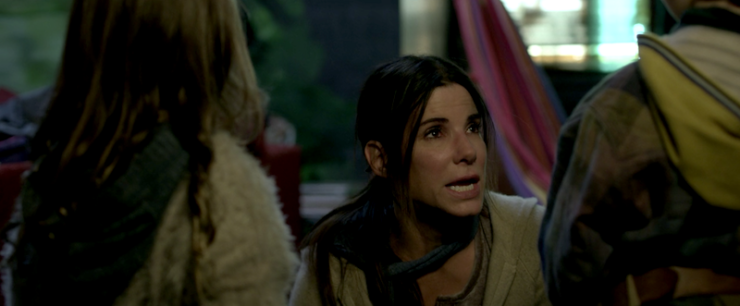
When we’re introduced to Malorie, she’s telling two five-year-old children that they have to follow her directions to the letter as they navigate down a river in a rowboat, blindfolded. She tells them that if they don’t follow her instructions exactly, “I will hurt you.” Flashbacks throughout the movie explain how Malorie ended up in this situation: the world was suddenly overcome by unknown entities, and almost everyone who looks at them immediately commits suicide.
Prior to the apocalypse, Malorie was already pregnant by a man who broke up with her—she was not looking forward to being a mother, and found it hard connecting with people. Ending up in a house with fellow survivors, Malorie gives birth simultaneously with another woman named Olympia, and when their hideout is compromised, Olympia is exposed to the sight of the entities and kills herself. Malorie becomes responsible for both Olympia’s daughter and her own son, escaping with the only other house survivor, Tom.
While Tom is affectionate toward the children as they grow, and indulges their imaginations in order to give them hope, Malorie spends the next five years keeping her distance. She calls the children only “Girl” and “Boy”, and they call her by her first name. She teaches them the mechanics of survival and berates Tom for giving them stories to cling onto. But when they lose Tom, and she is forced to try and make the journey to a rumored safe haven down the river, Malorie learns precisely what the cost of refusing a maternal mantle will be.
In their two-day journey on the river, Malorie comes to realize that they will only survive if she decides to be a true mother to Boy and Girl. Her desire to keep them alive will not prove successful if she refuses to love them openly and finally connect with them as people rather than charges. This bears out in two key points of the story: Malorie has been told that in order to navigate the river’s rapids, someone will have to remove their blindfold and call out directions, leaving them vulnerable to the creatures. It has to be one of the children since Malorie cannot risk losing control of the boat, and while both Boy and Girl bravely volunteer, Malorie insists that she will be the one to decide which child she is essentially giving up. There is a moment when it seems she will let Girl do it, thereby reinforcing the idea that she could obviously only feel responsibility and love toward the child she gave birth to, and suggesting that her “adopted” daughter is less important in her eyes. But when the choice has to be made, Malorie refuses it, telling them that no one will be looking. They take their chances on the rapids utterly blind and though they lose the boat, all three manage to survive.
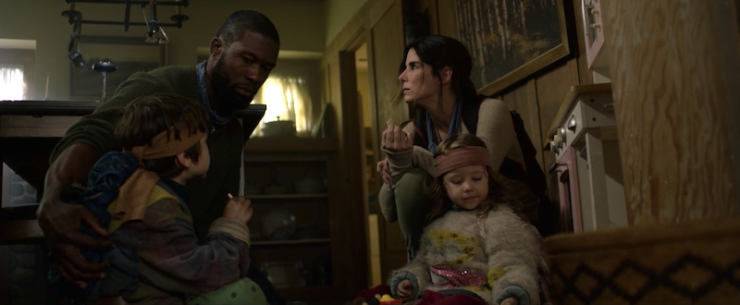
As they make their way to the haven through a wood, the creatures begin whispering to their victims, taking on voices of people they lost or trusted in order to convince them to look. Boy and Girl get separated from Malorie and then each other, and the creatures mimic Malorie’s voice, telling them to take their blindfolds off. Malorie screams at the creatures not to take her children (the first time she refers to them as her own) and finds Boy before he removes his blindfold, but her calls for Girl go unanswered. Her son explains why Malorie is having such a hard time getting through to her: “She’s scared of you.” Realizing that her harsh nature and refusal to connect have alienated her daughter, Malorie makes a plea in the middle of the forest. She tells Girl that she should never have stopped Tom from telling them stories, and that she shouldn’t have been so cold. She promises that things are going to change, that they will be a family. In promising to truly be a mother to her children, Girl hears Malorie’s voice and returns to her.
When they finally make it to the door of the sanctuary, no one seems keen in letting them in. But Malorie pleads on behalf of her children, begging whoever is listening to just take Boy and Girl and leave her to the monsters, and they are finally brought inside to safety. In the world of Bird Box, the implication is clear—Malorie’s coldness toward the children nearly gets them all killed. It is only in acknowledging that she is a mother, that she loves her children, that she only ever wanted what was best for them, that they are able to survive.
The thing is, Bird Box would have still made sense as a thriller/survival movie even if Malorie was a warm and loving parent all the way through the narrative. But it is specifically her detachment from motherhood—and not the ill-defined monster threat—that makes this a horror story. The idea of a mother who isn’t maternal is horror. And Bird Box isn’t the only recent horror film that has used this theme to stoke narrative tensions: The Babadook uses it, Hereditary uses it, even the latest Halloween soft reboot centers on how miserable Laurie Strode made her daughter Karen’s childhood in preparing her for another potential attack from Michael Myers. It is a popular trope because we still hold motherhood in a place of cultural sacredness, and simply will not cosign the concept that women have parental difficulties, too. Motherhood equates to saintly and unyielding devotion—while fatherhood is nothing but a happy bonus if you get it right.
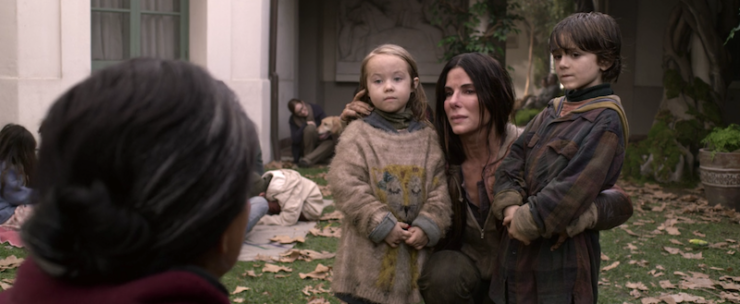
Together, these tropes paint a distorted reflection of family life, misrepresenting the challenges of parenthood. It is not impossible (or even improbable) for men to be good, nurturing, and loving parents. It is not impossible (or improbable) for women to struggle with that same custodianship of young lives. Being a parent is one of the world’s hardest jobs, and everyone who attempts it has their own difficulties. But when men’s hardships are framed as utterly unsurprising (and sometimes even charming) and women’s are sold to us as tales of terror, we are being told who bears the brunt of the responsibility to get it right. The expectation that women tackle every family job with perfection is the real horror story we’re constantly being served.
The solution here isn’t a simple one. But it might be nice to occasionally see a mother struggling, and not have it framed as the end of the world or a potential threat to everyone’s lives. Michael Banks thinks of his dead wife and begins to cry—then people come to his aid and the world gets better. Imagine what the world would look like if every mother at her wit’s end were afforded that same aid and comfort, even in our stories.
Emmet Asher-Perrin did not like Bird Box very much, just to be clear. (Boy that ending.) You can bug him on Twitter, and read more of her work here and elsewhere.










